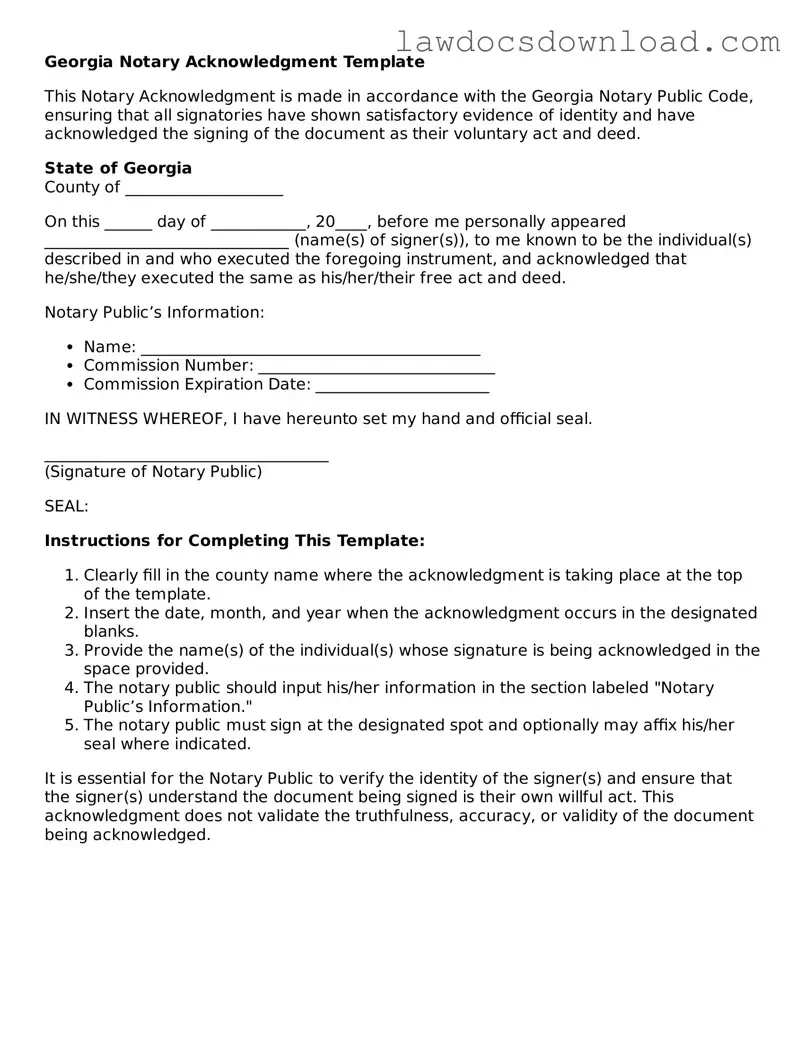The Georgia Notary Acknowledgement form shares similarities with an Affidavit, as both require a notary public to verify the identity of the signer. The crucial aspect of an affidavit is the signer's sworn statement, attested under oath, similar to how the acknowledgement form validates the signer's acknowledgment of the document. This verification process is essential to ensure the document's authenticity and the signer's understanding and agreement to its contents.
Another document akin to the Georgia Notary Acknowledgement form is the Power of Attorney (POA). Both documents necessitate notarization to confirm the identity of the parties involved and the authenticity of their signatures. The POA grants someone authority to act on another's behalf, and the notarization process adds a layer of legal validation, mirroring the acknowledgement form's purpose of certifying a signer's acknowledgment.
A Mortgage Agreement also parallels the Georgia Notary Acknowledgement form in that both are often required to be notarized to go into effect. The notary public verifies the signers' identities in a Mortgage Agreement, ensuring that all parties understand and agree to the terms. This process of validation and acknowledgment is crucial for the legal binding of the document, similar to the acknowledgment form's objective.
The Deed of Trust, like the Georgia Notary Acknowledgement form, involves notarization to confirm the document's legitimacy and the signatories' agreement to its terms. This document transfers the title of a property to a trustee until a borrower repays a loan. The notarization acts as a safeguard, ensuring that the transfer is recognized and agreed upon, akin to the acknowledgement form's role in verifying acknowledgment and understanding.
A Quitclaim Deed, which transfers property from one party to another without a sale, similarly requires notarization like the Georgia Notary Acknowledgement form. The notarization process in both documents serves to verify the identities of the signers and the genuine nature of their signatures, ensuring the transfer or acknowledgment is legally recognized.
The Lease Agreement, a contract between a landlord and tenant, often requires notarization in the same vein as the Georgia Notary Acknowledgement form. Notaries verify the parties' identities and consent to the agreement, ensuring that it is entered into knowingly and willingly. This parallels the acknowle{{Knowledge cut-off date|show=}}dgement form's purpose of certifying voluntary agreement to a document.
Similar to the Georgia Notary Acknowledgement form, a Living Will, which outlines a person's wishes regarding medical treatment if they become unable to communicate, often needs to be notarized. This process ensures that the document reflects the signer's true intentions and is done voluntarily, echoing the recognition and validation processes of the acknowledgment form.
The Bill of Sale, documenting the transfer of ownership of personal property from one party to another, shares the requirement of notarization with the Georgia Notary Acknowledgement form to confirm identity and consent. This legal step ensures the sale is willingly made and accepted, akin to how the acknowledgment form verifies the voluntary nature of acknowledging a document.
A Marriage Certificate application process may also involve notarization, much like the Georgia Notary Acknowledgement form, to attest to the identity and voluntary consent of the parties. This verification is crucial for legal recognition of the marriage, paralleling the acknowledgment form's role in ensuring documents are willingly signed and agreed upon.
Finally, a Contract Agreement, which outlines the terms of a deal between two parties, often includes a notarization process similar to the Georgia Notary Acknowledgement form. The notary's role in verifying the signatures and the signers' understandings of the contract parallels the acknowledgment form's function, ensuring agreements are made knowingly and with true consent.

